
Mosquito-Borne Virus Summary for Barnstable County
Fall/Winter Update
Now that temperatures have dropped and days are shorter, the mosquito populations have declined significantly. The species of mosquitoes that transmit West Nile Virus (WNV) overwinter as adults so you may see them flying around on warmer days, however they are not aggressive biters and do not blood feed when they are in diapause (insect hibernation).
Learn More about Symptoms of Eastern Equine Encephalitis and West Nile Virus in Humans
Updated: September 30, 2024
Barnstable County has been closely monitoring developments regarding mosquito-borne viruses (also referred to as arboviruses), including:
Eastern Equine Encephalitis (EEE), a rare but severe illness that recently caused the death of a New Hampshire man. This year, there have been four human cases of EEE in Worcester, Plymouth, and Middlesex Counties this season: a male in his 80s in Worcester County (onset of symptoms: August 6); a female in her 30s in Plymouth County (onset: August 17); a male in his 50s in Middlesex County (onset: August 12); a male in his 70s in Middlesex County (onset: August 22).
West Nile Virus (WNV), a more common viral illness that is often asymptomatic; 20% of individuals develop symptoms such as headaches, body aches, joint pains, vomiting, diarrhea, or rash. There have been 13 WNV human cases this season including 1 in Barnstable County: a man in his 60s with symptoms beginning 8/24 that include encephalitis. People over 50 are more likely to experience severe outcomes such as encephalitis (inflammation of the brain) or meningitis (inflammation of the membranes that surround the brain and spinal cord).
Risk on Cape Cod
Risk levels are updated routinely by MADPH and can be viewed at the bottom of this page or at the Massachusetts Arbovirus Surveillance Dashboard.
Risk for EEE has been elevated to MODERATE in Provincetown. Two mosquito samples trapped in Provincetown tested positive for EEE on 8/29, prompting the increased risk designation from low to moderate. One of the mosquitoes is a bird biting mosquito, while the second is an aggressive mammal biting mosquito that tends to develop in temporary wet areas following rainfall. While this mosquito is most active after dusk, they will bite during the day in areas of low light.
Cape Cod Mosquito Control Project—the local entity that conducts mosquito trapping. monitoring, and control in all of Cape Cod’s 15 towns—has been checking and treating areas around the EEE positive samples. Crews in all areas continue to focus on white cedar swamps and red maple swamps where mosquitoes that have been found to carry EEE develop.
All other Cape Cod towns currently maintain a EEE risk level of remote or low. However, risk levels in neighboring towns of Plymouth, Carver, Middleborough, Mattapoisett, Rochester, Wareham and others are reported as HIGH or MODERATE according to MADPH. Keeping this in mind, Barnstable County officials urge residents and visitors to consider the same precautions that are being recommended in these high-risk regions. As we head into fall, birds are moving around and carrying these viruses to different areas.
Risk for WNV has been elevated to HIGH in the following Cape Cod towns: Sandwich, Mashpee, Barnstable, and Yarmouth. Risk is MODERATE in Falmouth, Bourne, and Dennis.
Mosquito Trapping Results
Cape Cod Mosquito Control Project has collected over 600 mosquito pools and submitted them to the MA DPH lab for testing since July. See all positive mosquito testing results in the dashboard embedded at the bottom of this page or visit MA DPH’s Arbovirus dashboard website.
Risk of Mosquito-Borne Illness Transmission in our Region Persists until the First Hard Frost
As their population ages, mosquitoes have more opportunities to carry and transmit disease, which is why we see more mosquitoes testing positive during the late summer/early fall months. In fact, in past years, individuals have become infected with EEE in September and October. Therefore, preventing mosquito bites remains essential until after the first hard frost.
Aerial Spraying of Insecticides
The Massachusetts Department of Public Health annually reviews their Arboviral Response Plan, which lays out the criteria for when they will use different types of mosquito control interventions. While truck-based spraying has been commonly conducted in Plymouth County and other regions of Massachusetts throughout the season, aerial spraying is reserved for situations where there is a high risk of human disease. If you’re interested in learning more specifics about the state’s spraying practices, visit: Mosquito control and spraying.
MA DPH posts when and where they will be spraying here: Mosquito Spray Map.
To-date, aerial spraying has occurred in Plymouth County in the following locations: All of the town of Carver, and parts of the following towns: Halifax, Kingston, Middleborough, Plymouth, Plympton, Rochester, and Wareham. The woman infected with EEE in Plymouth was bitten before the aerial spraying, demonstrating the need for this last resort measure.
Truck-based spraying occurred in southern Worcester County the evenings of August 27 through 30, 2024, in the following towns: Douglas, Dudley, Oxford, Sutton, and Uxbridge. Trucks completed spraying as of 9:30pm Friday, August 30, 2024.
Neither truck nor aerial spraying has taken place in Barnstable County.
Eastern Equine Encephalitis Transmission Cycle
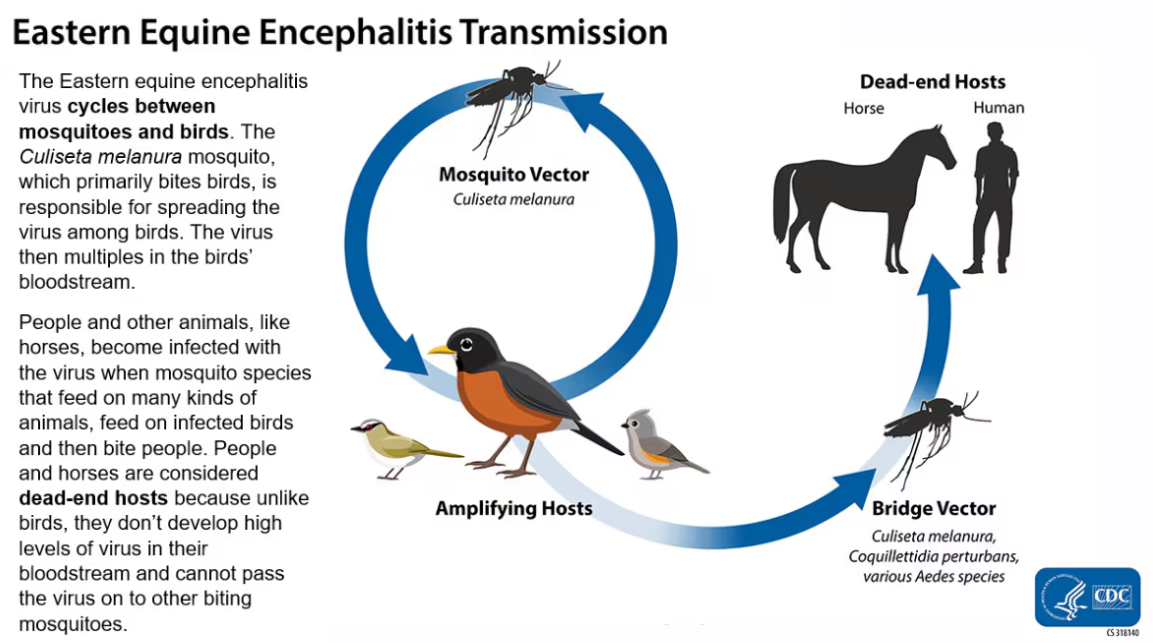
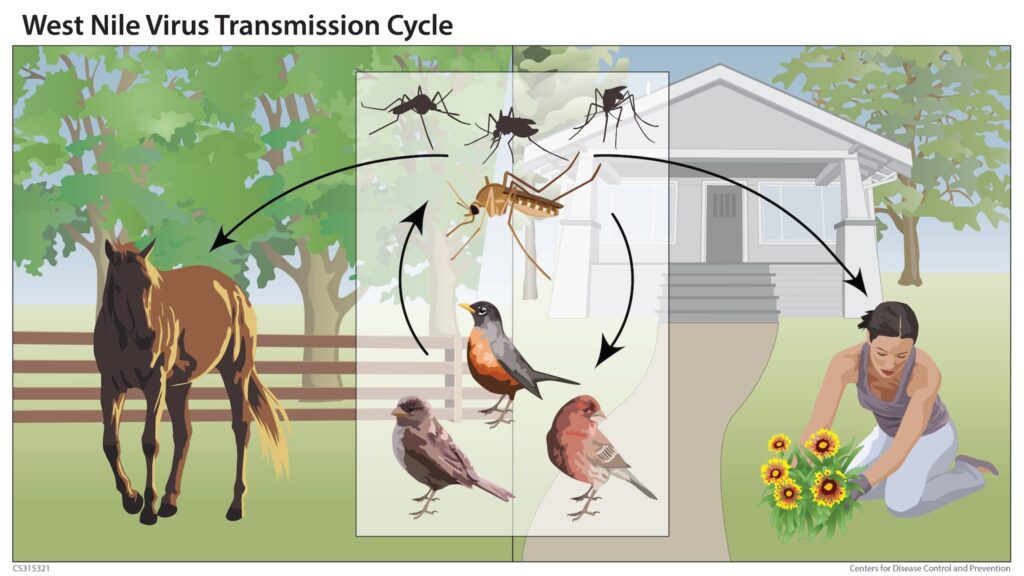
Preventing Mosquito Bites: Personal Protection is ESSENTIAL
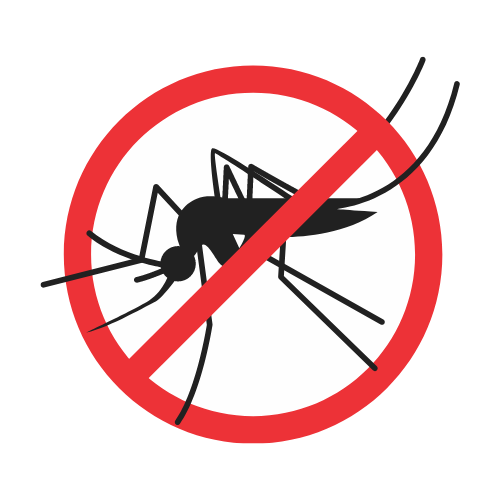
- Anytime you are outdoors, use EPA registered repellents! Being outside for even a short time can be long enough to get a mosquito bite. Use insect repellents with 20–30% DEET, 10–20% picardin, 10–20% IR3535, or 30–40% oil of lemon eucalyptus on skin and clothes to prevent bites. Make sure to follow directions on the label.
- Be vigilant! Be aware of mosquitoes around you. If mosquitoes are biting you, reapply repellent, or think about going inside.
- Wear long clothing! When outside wear long pants, sleeves, shoes, and socks. Apply permethrin to clothes and gear. It lasts through several washes after it is applied. Do not apply permethrin directly to skin.
- Use mosquito netting for babies! Use mosquito netting on baby carriages or playpens when your baby is outdoors.
- Reduce mosquito habitat around your home! Mosquitoes can breed in as little as ONE CUP of standing water. Check around your home and dump standing water twice weekly (or more depending on rain). For more information about protecting your home, see “Protect Your Home” below.
- TO BE MOST CAUTIOUS: Stay indoors! It’s best to remain indoors when mosquitoes are most active–which is dusk to dawn.
- TO BE MOST CAUTIOUS: Avoid camping overnight near freshwater swamps to reduce your risk of exposure to mosquitoes that carry the EEE virus. If you do go camping, use a tent with mosquito netting and use appropriate repellents.
If you are BITTEN
- Wash the bite with soap and water.
- Apply calamine lotion to help stop the itching.
- If you get sick after being bitten and suspect a mosquito-borne illness, CALL YOUR DOCTOR!
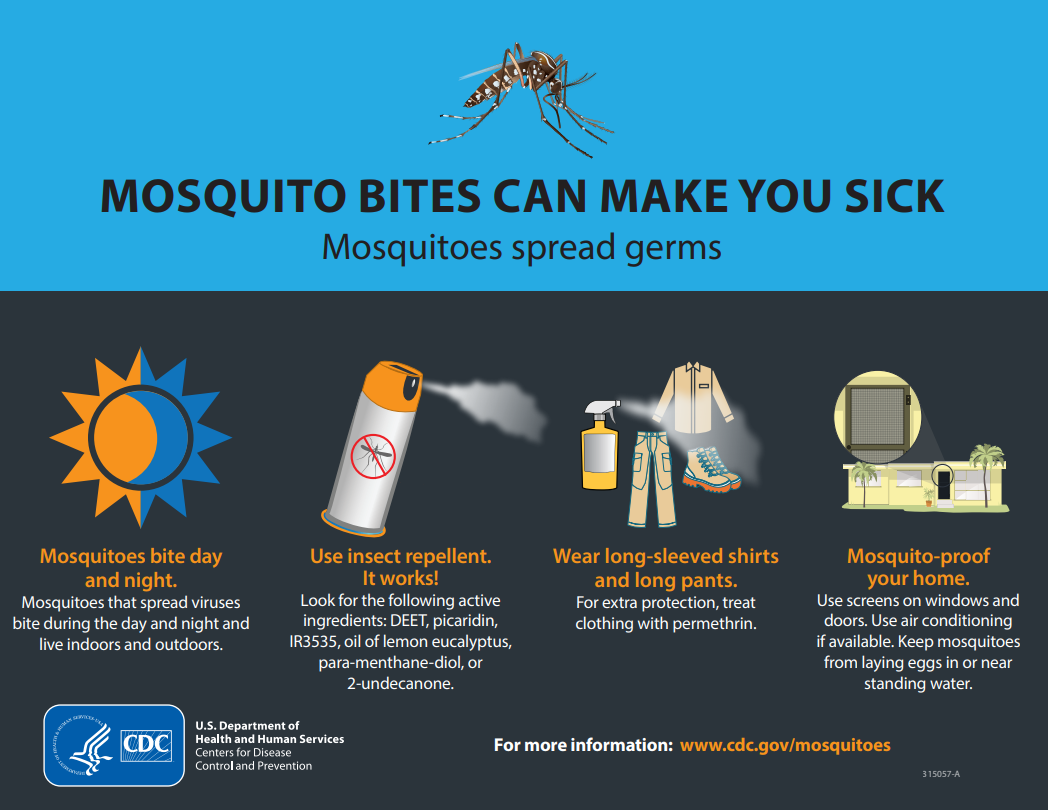
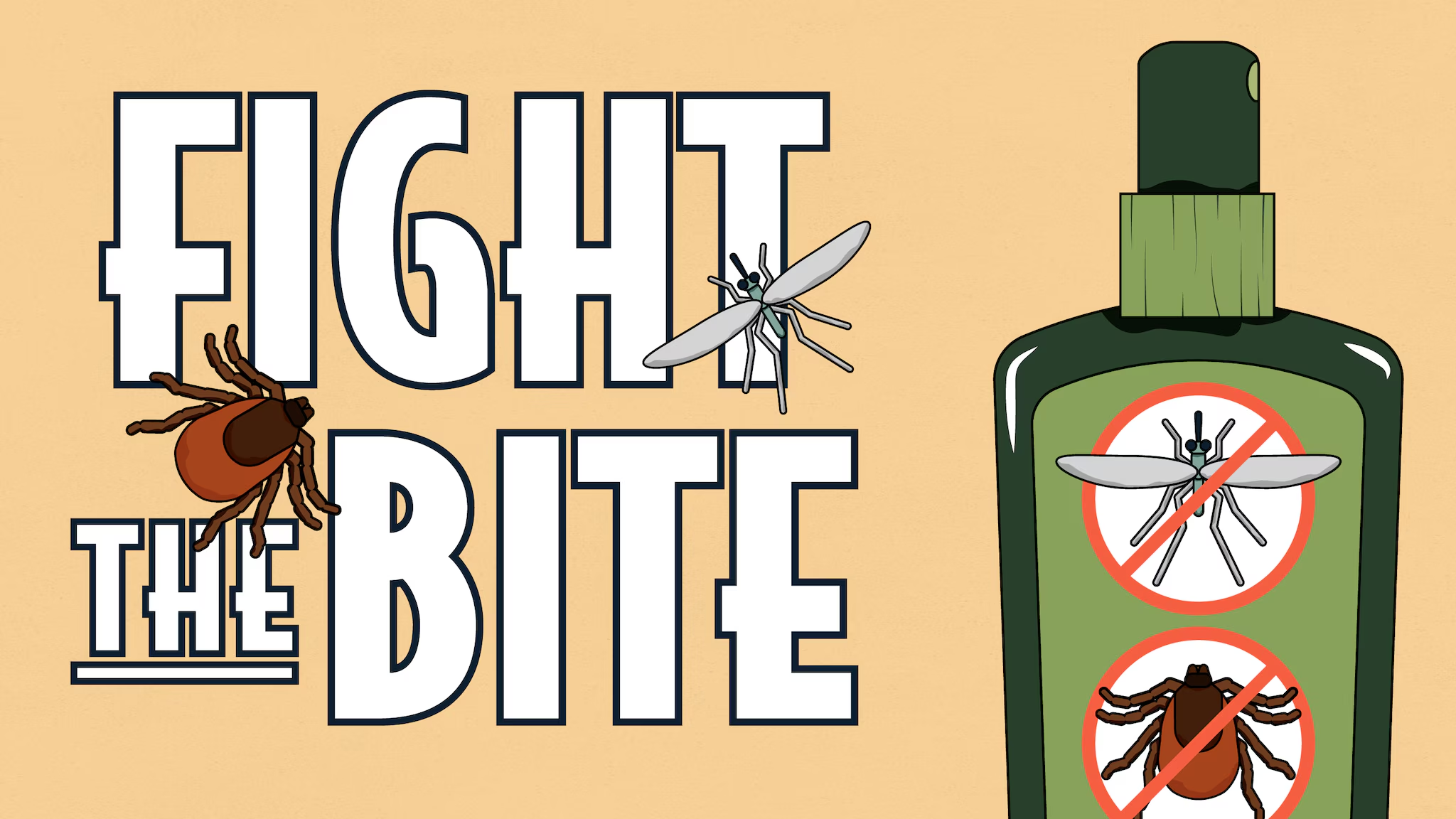
Protect your Home
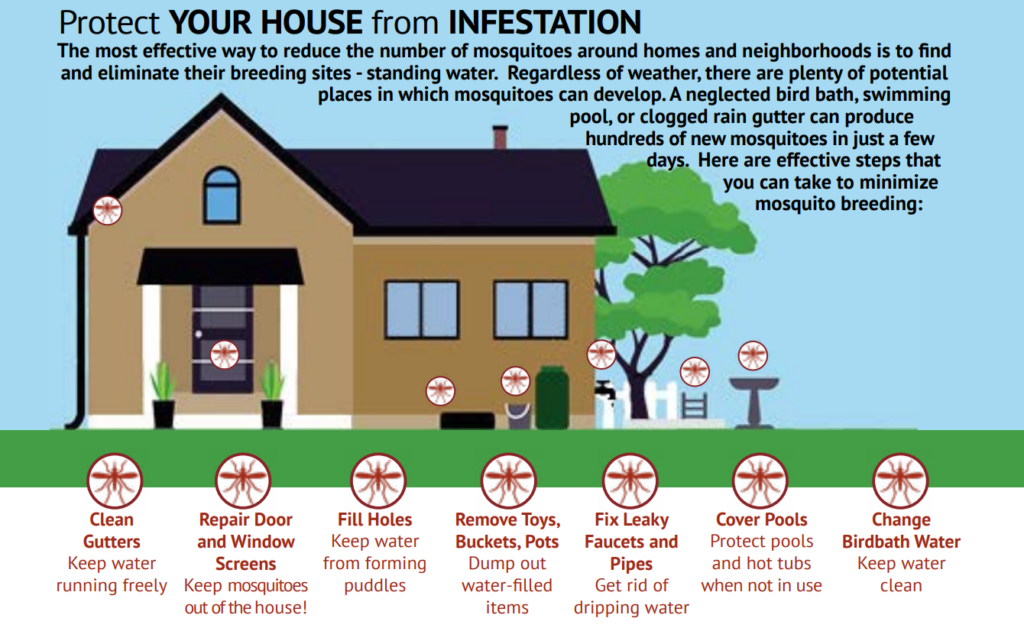
The most effective way to reduce the number of mosquitoes around homes and neighborhoods is to find and eliminate their breeding sites – standing water. Regardless of weather, there are plenty of potential places in which mosquitoes can develop. A neglected bird bath, swimming pool, or clogged rain gutter can produce hundreds of new mosquitoes in just a few days. Here are effective steps that you can take to minimize mosquito breeding:
- Clean gutters: keep water running freely.
- Repair door and window screens to keep mosquitoes out of the house.
- Fill holes and keep water from forming puddles.
- Remove toys, buckets and pots; dump out any water-filled items.
- Fix leaky faucets and pipes to get rid of dripping water.
- Cover and protect pools and hot tubs when not in use.
- Change birdbath water regularly to keep the water clean
Massachusetts Arbovirus Surveillance Dashboard
Find local risk levels for Eastern Equine Encephalitis (EEE) and West Nile Virus (WNV) based on seasonal testing.



